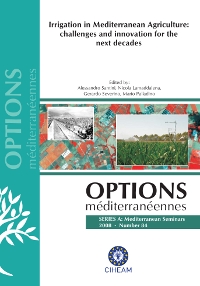| Article précédent | p. 257-266 | Article suivant |
Water resource management at district level. First results of AQUATER research project
An efficient management of water resources is a crucial point for Italy and in particular for Southern areas characterized by Mediterranean climate in order to improve the economical and environmental sustainability of the agricultural activity. AQUATER is a research project funded by the Italian Ministry of Agriculture, Food and Forestry Policies (2005-2009). It aims at developing a decision support system able to integrate remote sensing information and crop simulation model to allow a best management of irrigation water at district scale. It is focused on the remote sensing, the plant and the climate and, for interdisciplinary relationships, the project working group consists of agronomists, engineers and physicists. The Project is structured in four workpackages with specific objectives, high degree of interaction and information exchange: 1) Remote sensing and image analysis; 2) Cropping systems; 3) Modelling and softwares development; 4) Stakeholders. In the paper the main results of the first two years of the Project are reported and briefly commented.
Une gestion efficiente de la ressource en eau est cruciale pour l'Italie et en particulier pour les régions du sud, à climat méditerranéen, pour améliorer la durabilité des activités économiques et environnementales. AQUATER est un projet de recherche financé par le Ministère Italien de l'Agriculture (2005-2009). Il a pour but de développer un système d'aide à la décision capable d'intégrer les informations de la télédétection à celles des modèles de simulation des cultures pour permettre une gestion de l'irrigation plus efficace au niveau du périmètre. Le projet est centré sur la télédétection, la plante, le climat et les relations interdisciplinaires, ainsi les quatre groupes de travail du projet comprennent des agronomes, des ingénieurs et des physiciens. Chaque groupe a des objectifs spécifiques et un haut degré d'interaction. Chacun s'échange des informations sur : 1) la télédétection et l'analyse de l'image; 2) l'assolement; 3) le développement des modèles et des logiciels; 4) les parties prenantes. Dans cet article, les principaux résultats des deux premières années du projet sont présentés et brièvement commentés.
- [ Afficher ]
- [ Télécharger ]
- [ Exporter la citation ]
Vous pouvez télécharger la citation au format :
- [ Imprimer ]
-
Mots-clés
AIDE A LA DECISION, CLIMAT MEDITERRANEEN, CULTURE IRRIGUEE, EFFICIENCE D'UTILISATION DE L'EAU, GESTION DES EAUX, IMAGERIE, MODELE DE SIMULATION, PROJET DE RECHERCHE, TELEDETECTIONCiter cet article
Rinaldi M., Acutis M., Castrignanò A., D'Urso G., Mastrorilli M., Mattia F., Rana G., Ventrella D. Water resource management at district level. First results of AQUATER research project. In : Santini A. (ed.), Lamaddalena N. (ed.), Severino G. (ed.), Palladino M. (ed.). Irrigation in Mediterranean agriculture: challenges and innovation for the next decades. Bari : CIHEAM, 2008. p. 257-266. (Options Méditerranéennes : Série A. Séminaires Méditerranéens; n. 84). International Conference on Irrigation in Mediterranean Agriculture: Challenges and Innovation for the Next Decades, 2008/06/17-18, Naples (Italy). http://om.ciheam.org/om/pdf/a84/00800972.pdf



